Definitions and components
E-commerce involves online purchasing of products using internet services.
The key components :
- Infrastructure/technology equipment.
- Information security:
- Cyber-security;
- Privacy;
- Risk.
- Communication.
- Transaction platforms:
- Online platforms;
- Social media.
Electronic commerce entails the modern use of technology to advance business culture, especially promoted by the advent of computer network connections via internet. E-commerce managers need to cope with trends in technology, marketing strategies, global cyber security issues and information, communication technology platforms which are constantly evolving. Therefore, one of the most important components of e-business management is strategic leadership skills that identifies and collaborate the emerging issues in technology (Chaffey et al.). In essence, such managers hold the vision and objectives of the company higher than their personal ambitions.
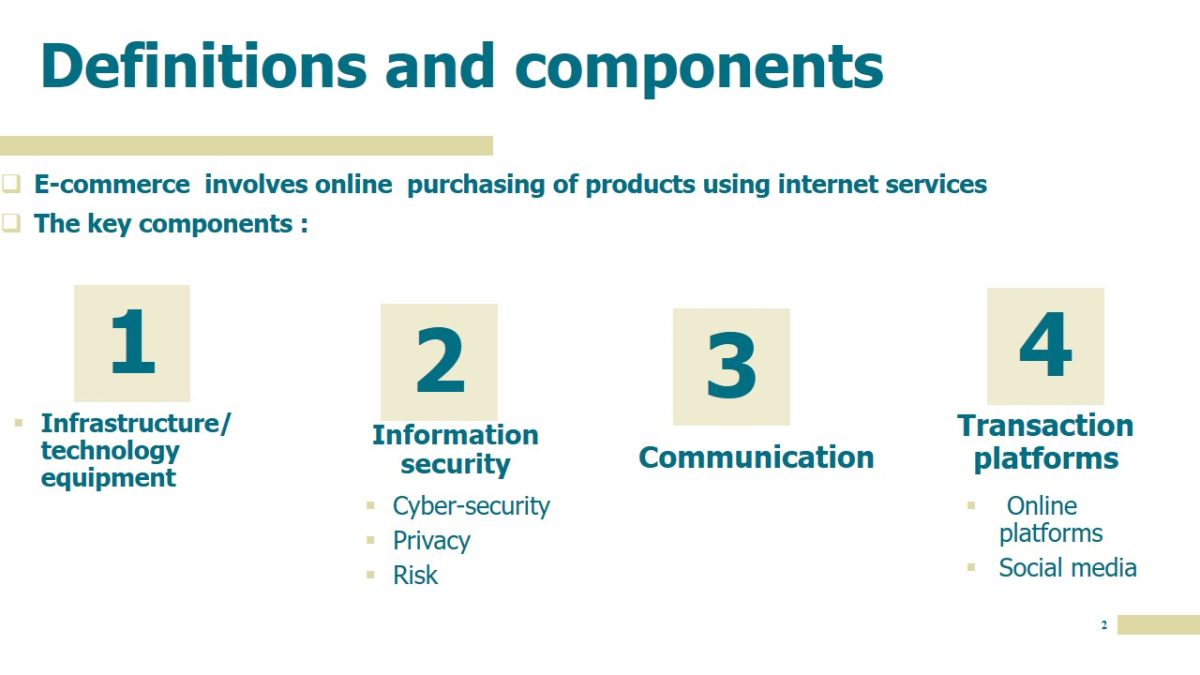
Types of E-commerce
Common Types of E-commerce and its components:
- Business to Business- B2B.
- Business to Customer- B2C.
- Customer to Business- C2B.
- Customer to Customer- C2C.
- Mobile commerce.
Although there are numerous types of online commerce, the basic types are those which involve business and consumers across the globe. Customer to customer operations include online transactions between one customer and the other. Sometimes, consumers can exchange certain goods with suppliers to get what they want. Business to business involves the exchange of goods and services among retailers and other business entities, for instance, Alibaba can import goods from Walmart to sell their clients in other parts of the world. Mobile commerce defines the use of mobile phones for online transactions. Currently, there are numerous marketing and chain of commerce taking place among mobile phone users, for instance, social media marketing is often focused on use of cell phones because of its massive use.
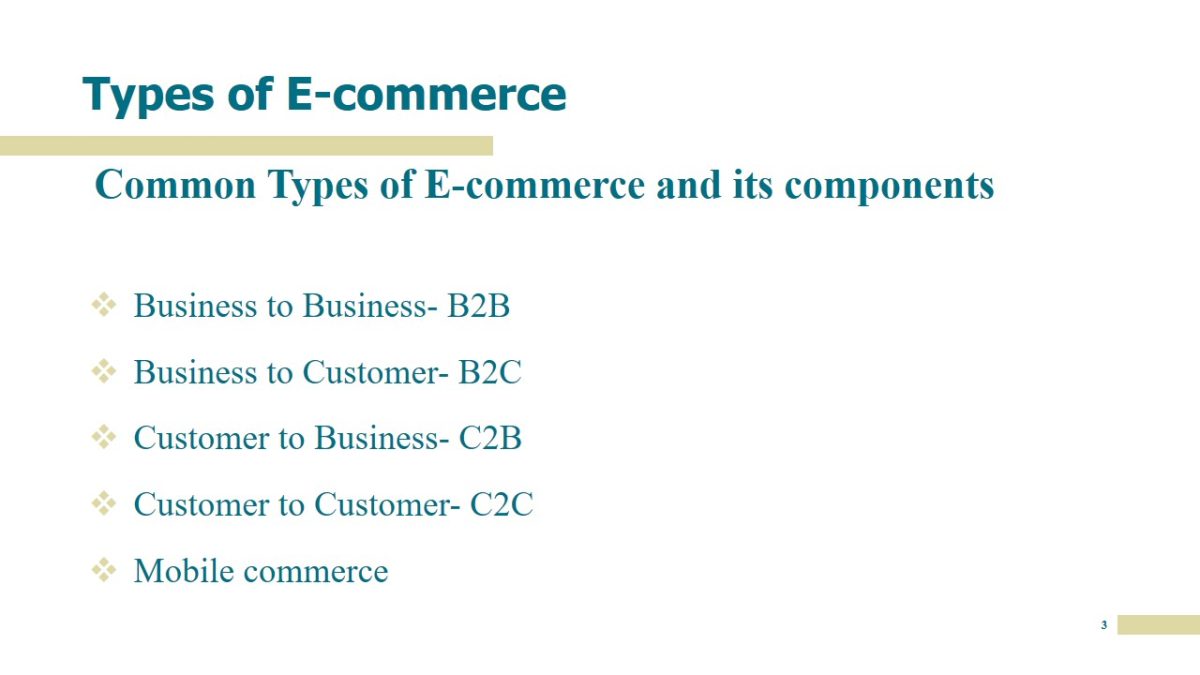
Worldwide Statistics
Global Perspectives in E-commerce:
- The retail e-commerce sector has seen tremendous steady rise over the past decade.
- Notable growth rate projection of $1.3 trillion in 2014 to $4.9 trillion in 2021 (Adrian).
- Social shopping is steadily rising; social media platforms such as Facebook, Twitter, and YouTube are the most vibrant online exchange means.
- B2B sales projected to hit more than $ 1trillion in 2021 (Adrian).
Currently, online shopping has become the giant in trade sector as retailers shift their focus to social media and other online platforms to do their purchases. According to Adrian, universal projections indicate that the sector has realized more than three-fold growth between 2014 to 2020, and might hit close to $5 trillion in 2021 with the persistent pandemic. Notably, business to business operations are the leading options as retailers exchange goods and services to supply to their local consumers.
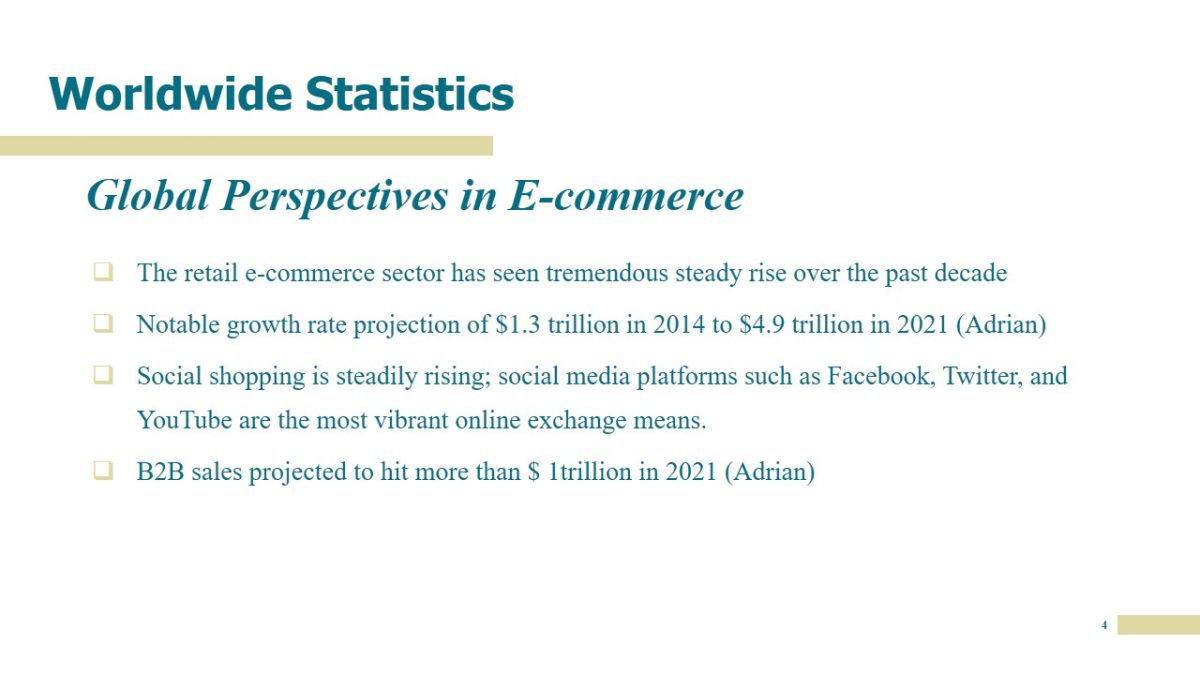
Internet-Based Business Models
- Access providers.
- Search engine.
- Online shop.
- Content provider.
- Search engine.
- Online service provider.
- Virtual community.
Technology has become one of the most important tools in modern lives. The surge in internet services and smart technology present firms with massive opportunities to showcase their business ideas to the world. Thus, there is a need to install internet in almost every premise today. Business entities use varieties of models to reach consumers worldwide. Although there are uncountable firms in the online platforms, these models remain fundamental in their successful operations (Kütz 26). Nonetheless, the ever-changing online modeling provides opportunities for new approaches everyday.
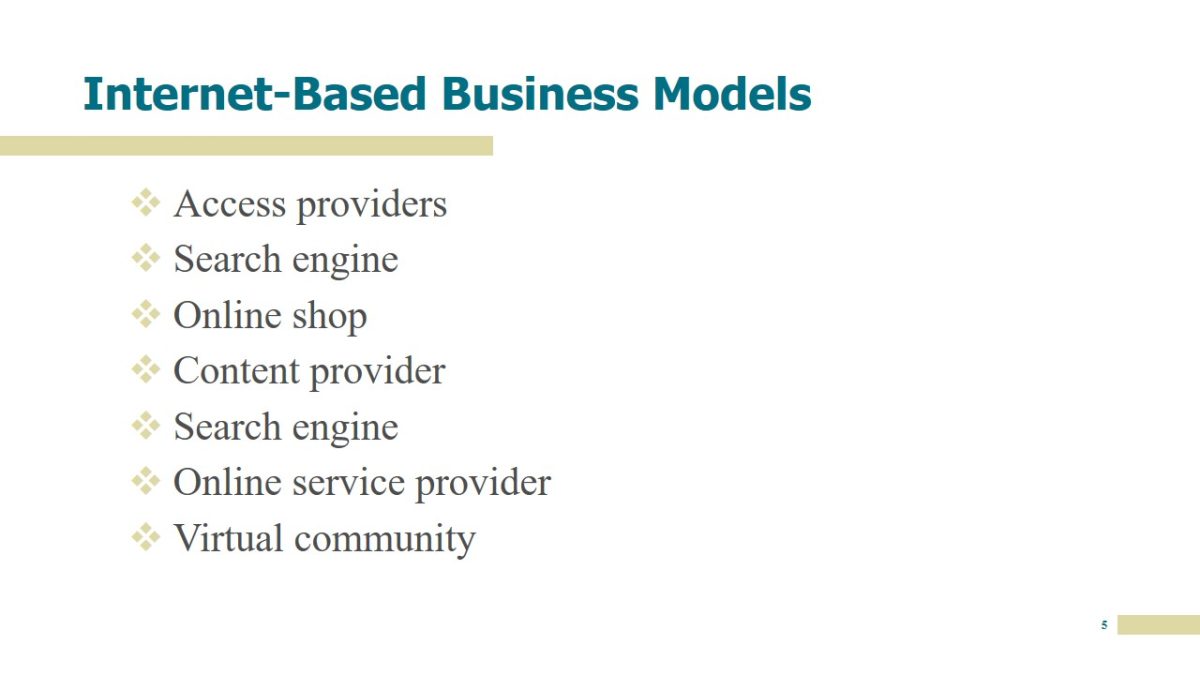
Contemporary management focus
Why do some e-commerce companies fail while others are thriving?
- What some managers focus on today:
- Digital marketing;
- Organization’s strategies;
- Finance- profit;
- Logistics.
- What others neglect:
- Partnership with other firms;
- Customers’ welfare;
- Task priority.
- How it affects management:
- Low sales;
- Slow growth;
- Poor brand image.
Although many organizations ventures into online transactions, not all of them seem to master the art and eventually fails. Organizations such as Walmart and Alibaba utilize major values of digital marketing, strategic financial investment to sell their products in the market (Yun et al.). At the same time, mergers and partnerships have provide to be vital in sustainable management of online market systems. Where a manager fails to recognize the importance of the customer’s feedback, there are higher chances that they may collapse in the long run. Thus, there is a need to integrate all aspects of management to ensure success of the business within the digital platforms.
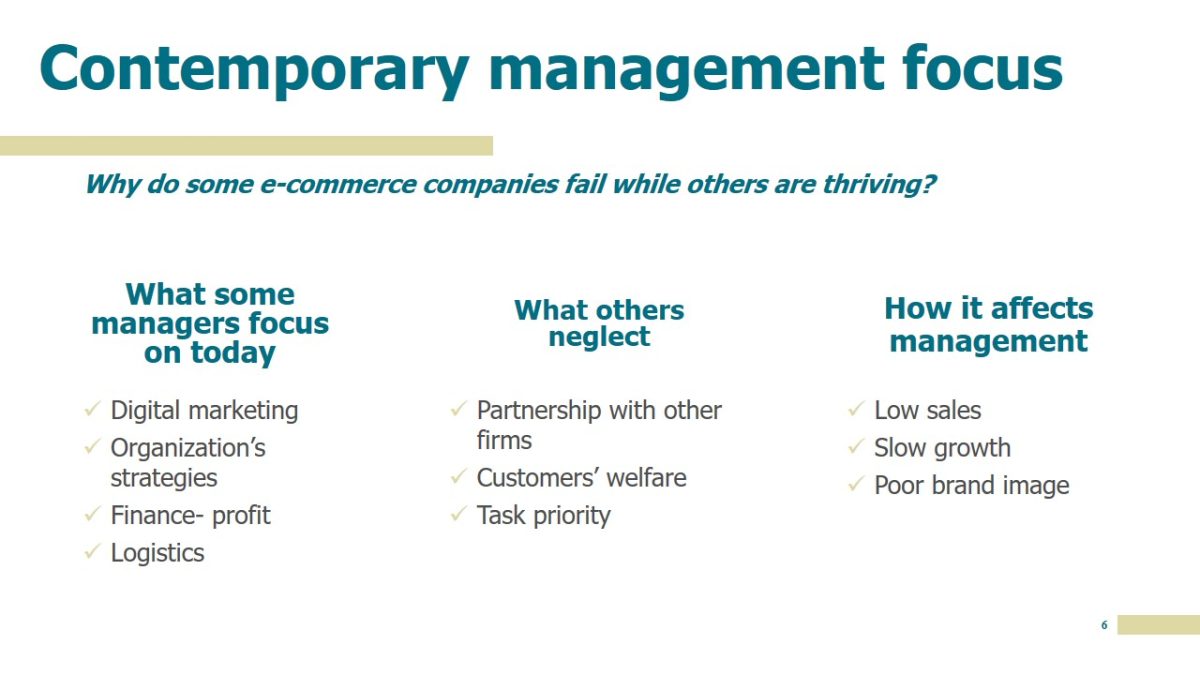
Challenges faced
- Technical challenges.
- Economic challenges.
- Cyber security.
- Competition.
- Customer experience.
- Market visibility.
The ICT systems require technical expertise that many organizations cannot successfully install and manage. As a result, administrations hire technology gurus at a cost which later reflect on the financial performances (Kütz 34). Moreover, the existence of hackers and other online threats seem to pose major challenges to entrepreneurs because their transactions are often at risk of intruders who have the capacity to steal their money. Likewise, it is hard to ascertain and fulfill customers expectations where there no close contacts and effective interpersonal relation. Thus, every enterprise struggles to become visible in the market.
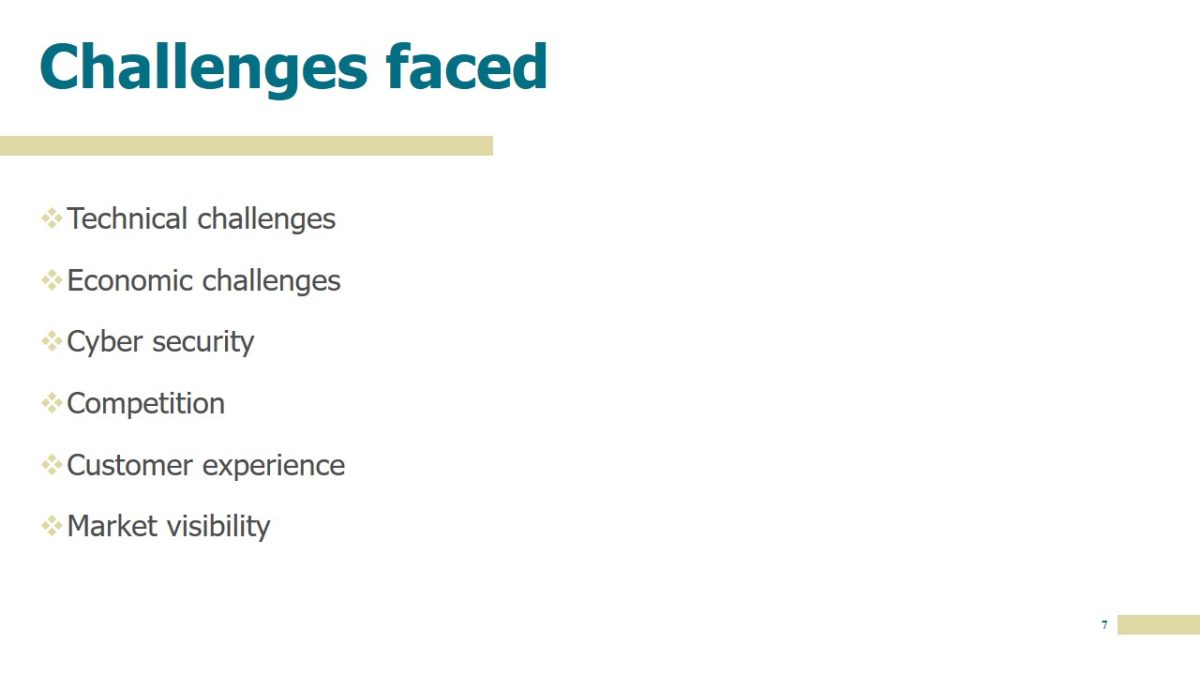
Importance of e-commerce in modern economy
- The world is shifting to digital economy.
- More business opportunities created online.
- Wider market access.
- Ease of communication.
Globally, there are more consumers in the digital market than any other platform. With the rising access to smart technology and internet services, people can now order their goods at the comfort of their homes and the firms deliver. This virtual relationship has created a more vibrant interaction platform.
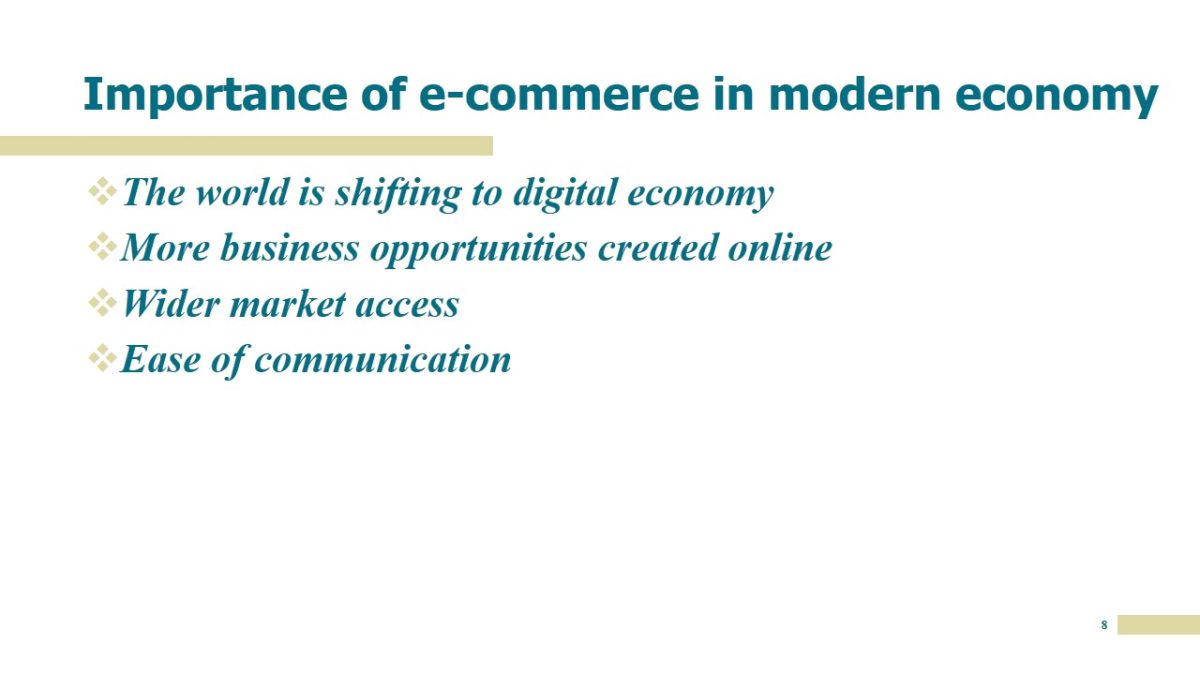
Conclusion
- Managers are responsible for branding and image sustainability.
- Managers should explore the values of effective communication and good leadership skills.
- Competent managers need to focus on online strategies, technology and capital investment.
- Knowledgeable managers should invest in evidence-based practices to meet the demand of online consumers.
To conclude, e-business in modern society requires comprehensive understanding of current trends and emerging issues in commerce. A respectable manager needs to understand these dynamics and participate in practical application of information to meet the demands. Competence in management will depend on the image of the firm among consumers, values and communication alongside strategic balance between use of technology and capital investment.
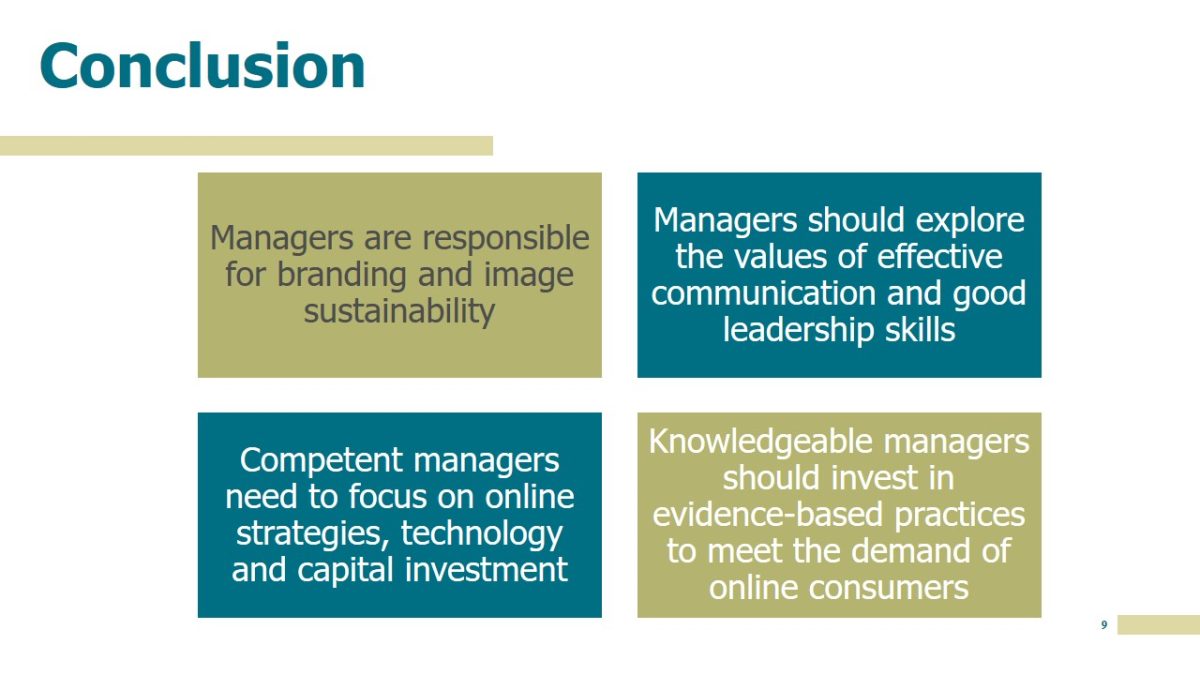
Work Cited
Chaffey, Dave, David Edmundson-Bird, and Tanya Hemphill. Digital business and e-commerce management. Pearson UK, 2019.
Kütz, Martin. Introduction to E-Commerce: Combining Business and Information Technology. Bookboon. 2016.
Yun, Jinhyo Joseph, et al. “Sustainability Condition of Open Innovation: Dynamic Growth of Alibaba from SME to Large Enterprise.” Sustainability, vol. 12, no. 11, 2020, p. 4379. Web.
Adrian. Future of Ecommerce: 10 International Growth Trends 2020. Web.